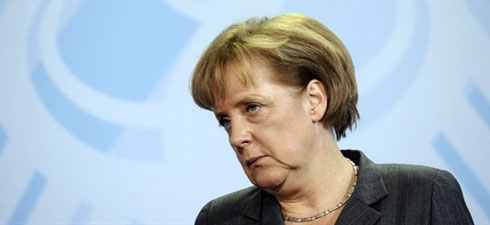It’s always worthwhile to listen closely to Angela Merkel. As she has proven repeatedly to her rivals at home and to Europe as a whole, she says what she means and means what she says. So when she announced this spring, right after the panic-driven mission to bail out Greece – and, consequently, the euro – that she would never let a crisis like that happen again and would seek to amend the European treaties accordingly, she had to be taken at her word. Merkel has now rallied the French president to her cause. Even if the rest of Europe raises a cry of outrage, the chancellor will have her amendment – because there is probably no alternative.
EU foreign ministers and members of the European Parliament will presumably come round to the same inescapable conclusion over the next few days. In 2013, the financial guarantees given by the eurozone states to protect the common currency will expire, and (for constitutional reasons, if nothing else) Germany won’t be party to a rehash, let alone an institutionalised version, of the big bailout. Then, if they haven’t done so already, the financial markets will pounce upon the overextended states of southern Europe. Hence the need for a crisis management mechanism, one that will facilitate an orderly debt-settling arrangement and, above all, force the creditors (ie the speculators) to shoulder some of the cost of the damage they have done.
Germany, the master of Europe
It remains to be seen whether this mechanism will entail revoking EU voting rights, which would humiliate the infringing debtor nation, and whether it will have to be rubber-stamped by referenda as a treaty amendment or whether there are other ways to go about it. Merkel herself knows there’s no pushing the Irish or the French to hold another referendum on Europe. As a matter of fact, that wouldn’t go down well in Germany either.
Such is her case, one which will be hard to refute. But what about the political leadership style? What about the likely perception in the majority of EU states that the Franco-German directorate has struck again? Or is Germany acting as a virtual European hegemon, the all-too-powerful export champion and growth colossus at the centre of the continent?
The reactions from the Luxembourg government, for example, or from the European Parliament show that the chancellor is indeed caught in the hegemonic trap, despite her efforts to sidestep it. Europe has drifted into perilous economic straits. It’s not a matter of East versus West or North versus South: the problem is the centre, which increasingly sticks up and stands out from the periphery. The problem is Germany, whose economy is developing a magnetic power of attraction – at its neighbours’ expense. If above and beyond its economic muscle, this country seeks to play the political know-all, resistance is bound to begin brewing abroad.
Straight talking is good, but sotto voce's even better
Ex-chancellor Helmut Kohl used to say he always bowed twice before the French tricolour. Former foreign minister Joschka Fischer used to philosophise about the European political dialectic: Germany had to lead – albeit without anyone noticing. What about Angela Merkel? Well, she acts as bluntly as she speaks. And that is hard to take for the nations on the periphery because they feel their weakness two-fold: Germany’s economic clout is overwhelming, and the rules of the game will ultimately be laid down in Berlin too. So Merkel had better weigh her words – and listen closely to what others are saying. You can prevail on the majority twice in six months and be right, too, but after that you’re definitely in for trouble.
Translated from the German by Eric Rosencrantz
Was this article useful? If so we are delighted!
It is freely available because we believe that the right to free and independent information is essential for democracy. But this right is not guaranteed forever, and independence comes at a cost. We need your support in order to continue publishing independent, multilingual news for all Europeans.
Discover our subscription offers and their exclusive benefits and become a member of our community now!












